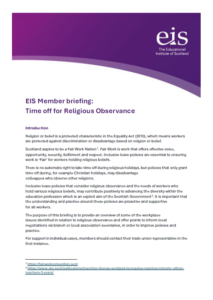
Recent world events, and historic inequalities, have created a difficult climate for Muslim teachers, learners and citizens, who have the same right as all other citizens to feel safe, respected and included at their places of work and learning.
An upsurge in what is commonly referred to as ‘Islamophobia’ – prejudice against Islam and Muslims – has been recorded in various research studies and in crime statistics. The EIS chooses to refer primarily to anti-Muslim prejudice rather than Islamophobia, as this form of prejudice does not constitute a phobia in the medical sense, and the language we use shapes our understanding of the issue at hand. It is important for prejudice to be named and confronted.
In response to the increase in hostility and prejudice towards Islam and Muslims, it is more important than ever for staff and students within educational establishments to understand how to prevent and challenge prejudicial attitudes and behaviours towards Muslims, and people perceived as Muslim. The purpose of this guidance document is to assist EIS members in those important tasks.
The advice contained in the guidance is relevant to all educational establishments in all communities in Scotland.
Follow @eisunion Tweets by EISUnion